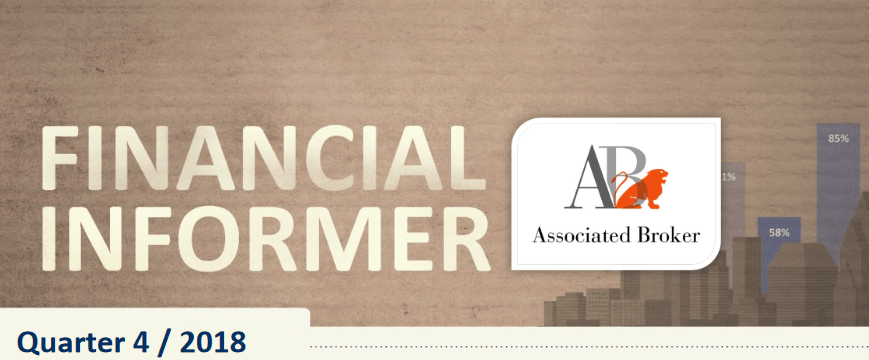Recession proofing your money
Depending on who you speak or listen to, South Africa is in a technical recession. There’s really nothing technical about a recession and investors should stick to the basics to protect their investment impetus and ability to generate wealth in these difficult times.
Recessions are unfortunately something we need to learn to live with and we need to structure and manage our investments accordingly. To cope with the inevitable volatility, regardless whether recession or boom, that characterises investment markets from time to time, you should always be appropriately diversified across asset classes, investment strategies and mandates so as to smooth the investment journey as much as possible.
A technical recession simply means that the SA economy has shrunk in size for two quarters in a row. This implies that companies are likely to make less profit from the South African economy and hence local share prices generally reflect this. While this most certainly negatively impacts certain assets, it also creates potentially lucrative opportunities for savvy investors to take advantage of during a recession. Here are 3 of the best tips for weathering a recession:
Understand how asset classes perform during a recession.
Due to the diminished buying power in the economy, it is likely that there will also be less demand-driven price pressures in the economy, which tends to benefit fixed-income assets like cash and bonds. Growth assets like locally-oriented equities or property generally suffer in a recession. This is the beauty of having diversified exposure to a wide range of asset classes in your portfolio.
Diversify with off-shore asset exposure
From a timing perspective, the best time to invest offshore is actually when the rand is strong, and not weak – which is when many investors tend to panic and look offshore. That said, if you don’t have sufficient offshore exposure, now is as good a time as any to diversify portfolios internationally. Who knows where the Rand will be in 6 months!
Moenie panic!
A recession will affect almost everyone’s investment in some form or another, but the negative impact will be far more for those who panic and make short-term, rushed decisions. As human beings, dealing with uncertainty and volatility is never easy. However, the prudent investor response would be to acknowledge that volatility is part and parcel of the behaviour of investment markets and to accept volatility as part of the DNA of investing. Remain focused on the long-term investment goals and most importantly, don’t panic or behave irrationally, and stay in-vested.

Taking cognisance
Knowledge of Cognitive Therapy is immensely helpful in combating panic. It may be that our anxieties right now are being fed by selective biases in our thinking—biases shared by millions of us who are watching the news. How can we be more rational?
How can we cure our financial panic attack? Here are some cognitive distortions that are possibly driving financial anxieties:
Catastrophic Thinking
It’s almost as if five minutes can’t go by watching the news without hearing catastrophic statements. But is there a catastrophe and will there be one? What is a financial catastrophe? Is it anything like the market dropping 89 % in the 1930s from its high and losing about 14.5 % per year for about six years until it mildly recovered by about 2 % in 1941? Further-more there was no medical aid, no unemployment insurance, no social security, no net to catch people in back then. People were falling from a low level of real wealth to begin with. So many people were destitute. Whilst this is still a reality for some South Africans it is, nevertheless, better than it was. Some people believe it’s a catastrophe to lose 20% in an overvalued stock portfolio, not recognising that they still have 80% of what they had before.
Some will claim we are heading toward a catastrophe. There are two ways of looking at these predictions. One is that it is possibly true if nothing is ever done. Second, it is not true, because it is inconceivable that even the ANC can’t get its act together.
Fortune Telling
Even though many people predict a recession, what is remarkable about the economy is how few recessions we have had in the last 25 years. And people survive re-cessions. A recession is two consecutive quarters of negative growth. That might mean that a business netting one million Rand might net R950,000. This is hardly hunger in the streets.
Discounting the Positive
This is rampant in how individuals and journalists respond to the crisis we are facing. One factor that is being mentioned is the potential for property values to be affected. It is a possibility but in Cape Town, where 50 square metre apart-ments sell for over 2.5 million, perhaps a slowing down of the property market is not such a bad thing. This could possibly mean that property loses value for now but if you are not selling your house this year, take a nap.
A lot has also been said about the rising fuel price. And yes it is a concern as the consequence will definitely be higher prices of consumer goods. However, fuel prices are considerably higher in many other parts of the world. GlobalPetrolPric-es.com publish the most wide-ranging and reliable data on retail fuel prices around the world tracking over 150 countries on a weekly basis. In their most re-cent report it can be seen that Venezuela pays the least for petrol at $0.01 per litre which roughly works out to 13 cents (in South African Rands) while drivers in Hong Kong can pay up to R31 for the same litre. In Africa Malawi pays R17.47 and Zambia R21.77 making SA the 5th highest in Africa. Not good but not the worst.
Selective Filter
There is currently considerable focus on the expropriation of property…and rightly so. However, the ANC’s election head Fikile Mbalula said that property rights in South Africa were not under threat, and that there was no intention to grab land. “The ANC position on expropriation with-out compensation is for specific circumstances in the land reform process. This is aimed at supporting open commerce and certainty,” Mbalula said. What isn’t entirely clear are the “specific circumstances”. However it is highly unlikely to include your house or business premises in the suburbs.
As many of you know, there is a field of economics called “behavioral finance”. It is cognitive therapy applied to investors. These are the times that we can really help people get a handle on reality. Examine the way that you are looking at recent news and chill…rationally.
Power play
It is common for a person wishing to authorise a trusted party to act on his or her behalf to sign a document known as a “power of attorney” (abbreviated as “POA”). But how does this far reaching document work and what are the pitfalls?
Generally, in our law, one can authorise a representative by oral or written means, without having to meet any formalities.
However, one exception is contained in the Deeds Registries Act which provides that a conveyancer may not execute a deed of transfer of an immovable property or a mortgage bond before a registrar of deeds unless he or she is authorised to do so “by power of attorney”.
To be acceptable to a deeds registrar a POA must be in writing and attested by two witnesses over the age of fourteen years, or by a commissioner of oaths, magistrate or justice of the peace.
Other than when required by a conveyancing attorney as described above, our law doesn’t in fact apply any formalities for the making of a POA. In theory, you could authorise someone by mere word of mouth to sell your car or draw your life savings from your bank account! Understandably the other party to a transaction (eg. your bank) may be hesitant to accept the word of your appointed representative as to his or her bona fides. Thus for practical reasons it has become practice whenever a POA is required to apply the formalities set out in the Deeds Registries Act. By rights the simple presentation of the POA by the representative should be sufficient legal proof of the bearer’s authority. However, most banks will not accept their client’s own power of attorney but will require a client and his or her representative to personally visit a branch to complete and sign the bank’s form of POA.
Powers of attorney can be “general” or “special”. A general POA is one where the representative is given the authority to act on behalf of the principal in all matters, while a special POA is one limited to a number of actions, even though the actions listed may be numerous.
A drawback in connection with POA’s is that it can only be acted on by the representative while the grantor (principal) still has the capacity to act himself. Some jurisdictions recognise “enduring” powers of attorney in terms of which the representative remains empowered even after the principal loses his capacity. South African law does not recognise the enduring POA; if a principal loses his capacity to contract, for example he falls into a coma, or is declared mentally incapable of administering his affairs, then his representative equally loses the authority to act on his behalf using a POA even if it was executed when he had capacity.
Clearly a POA cannot be used to transact on behalf of a principal who has died; the POA “dies” with the principal and only a properly appointed executor may act on behalf of the deceased estate.
A danger in signing a POA is that although it can be revoked by notice to the representative, it isn’t easy for a principal to notify the world at large of this. If the representative presents the POA to an unknowing third party who is induced to act on the face value of the POA, the law will protect that innocent third party.
A power of attorney can be a very useful tool to ensure that trusted persons can look after your affairs when you are unable to do so, but their limitations and pitfalls should be considered.
A danger in signing a POA is that although it can be revoked by notice to the representative, it isn’t easy for a principal to notify the world at large of this.


